- County Executive
- Elected Officials
- Legislature
- Departments
-
Welcome to the Putnam County Government Department Directory
Visit The Department Pages for Contact Information.
Note: The PUTNAM COUNTY COURTS are not affiliated with Putnam County Government. You can call the Putnam County Court’s phone system at 845.208.7800.
Hours of Operation
-
Regular Hours9:00am - 5:00pm
-
Summer Hours8:00am - 4:00pm
-
Our Partners
-
-
- Notices & Laws
- Tourism
- Careers
See Something? Say Something! Report Suspicious Activities Here! - PCTAM.NET
Quick Translate

News & Press Releases
The Putnam County Department of Health is made of several divisions all working towards improving and protecting the health of the community. Click on one of the options below to learn more about that division.
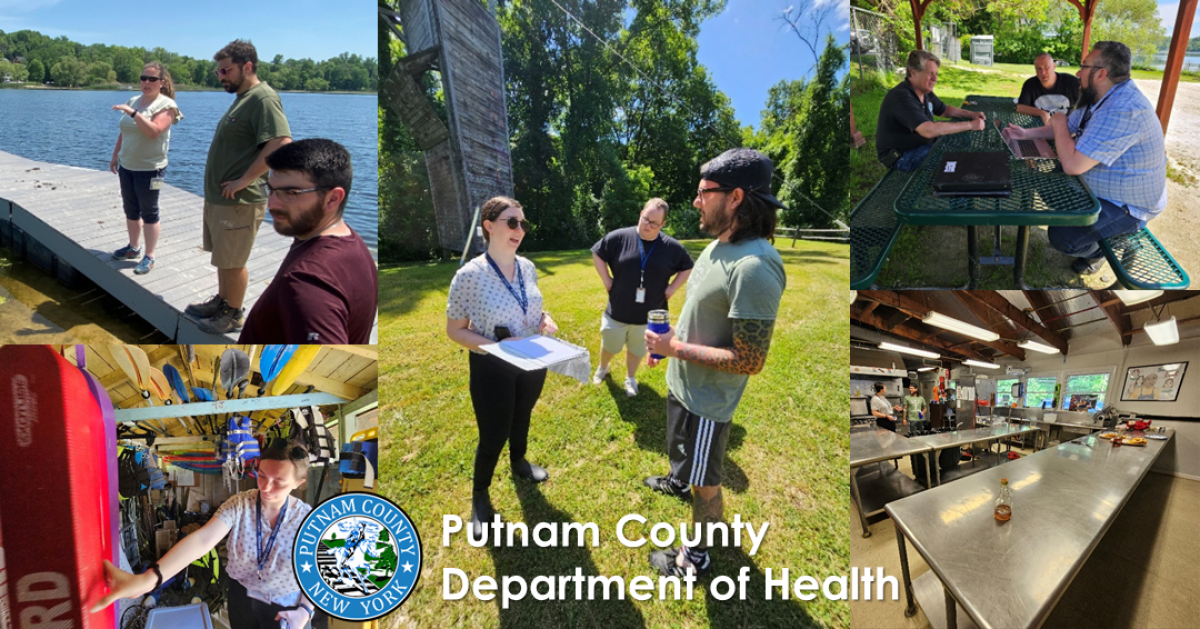
The PCDOH Makes Summertime Living Easy…and Safe
BREWSTER, NY—Summertime often means outdoor activities at the beach or pool. For lucky youngsters, it may also mean summer camp. To help ensure safe, injury-free vacation times for all Putnam residents and guests, preparations by Putnam County Department of Health span nearly five months of the year, culminating in the last weeks of June when camps are readying to open.
“There’s a lot of work that goes on behind the scenes,” explains associate public health sanitarian Marianne Burdick, who directs the health department’s efforts to inspect all of the more than two dozen summer camps in the county. The process starts early—back in February when the health department contacts camps about the safety plans that they must put together and return in early spring.
“We review all the camps’ paperwork and lifeguard certifications,” said Ms. Burdick. “We make sure all counselor-to-camper ratios are appropriate, and that “buddy systems” are understood and implemented effectively. When there are trips planned for campers, we require additional written documentation.” In these cases, plans must document the experience of trip leaders and their familiarity with the destinations. Permits are only issued to the camps after review of their plans and certifications, and any necessary pre-operational inspections are conducted.”
These pre-operational camp inspections are one of the final steps, occurring late in the month of June before the camps are scheduled to open, soon after school ends. Inspections are comprehensive, and those at overnight camps especially so. “There are a wide range of activities that occur at camps,” continued Ms. Burdick. “Some have high ropes, climbing walls and archery activities. Each needs to be checked so as to minimize any potential for injury.” Indoor facilities also require safety precautions, such as smoke alarms, and sleeping facilities and kitchens must undergo a thorough review and inspection.
Beaches and pools are subject to inspections throughout the summer season on a regular basis. They receive a pre-operational inspection, and two standard in-season checks. In addition to camps, there are nearly 35 beaches, and over 40 indoor and outdoor public pools, both, for a total of nearly 80 facilities that are monitored each summer. Water quality samples are collected by the health department’s full time public health sanitarians, along with additional seasonal environmental personnel who are necessary to manage the increased workload during the hot months.
“Samples are sent to an outside lab to test for fecal coliform bacteria,” says Ms. Burdick. This contaminant can increase in outdoor swimming areas, with the potential for sewer run-off, or pollution from goose droppings.
Interim health commissioner Michael J. Nesheiwat, MD, said, “Sampling and testing the water is the only way we can limit what are referred to as ‘recreational water illnesses’ that people can contract from contaminated water. Symptoms may include skin rashes, diarrhea, cough and congestion, and even ear and eye pain. Exposure occurs not only in pools and hot tubs, but also aquatic spray grounds, and natural water bodies such as lakes, rivers and even oceans.”
Another growing concern in natural water bodies in recent years are harmful blue green algae blooms, called “HABs.” Lately these have been causing beaches to close earlier in the season and more frequently later on. Associate public health sanitarian Brian Stevens, who oversees the beach program, explains how the weather plays a role in HAB blooms, saying that, “They tend to occur in hot, rainy weather—especially in lakes with nutrient-rich water.” Heavy rains can increase the run-off from lawn fertilizers and cause the algae to bloom. Swimmers and waders are at higher risk, but boating and fishing should also be avoided in areas with blooms. Pets are especially vulnerable and must be kept out of and away from blue green algae. “It’s unfortunate, but all contact with HABs should be avoided by both people and animals when blooms are present,” Mr. Stevens said.

Climbing walls offer a great full-body exercise that helps build strength in multiple muscle groups at once. Public health sanitarian Emily Olenius and environmental health aide James Danvin, center, from the Putnam County Department of Health, recently conducted an onsite inspection at Camp Herrlich. They met with camp director Scott Riches to ensure the wall’s safety certification paperwork was all in place before the camp opens.
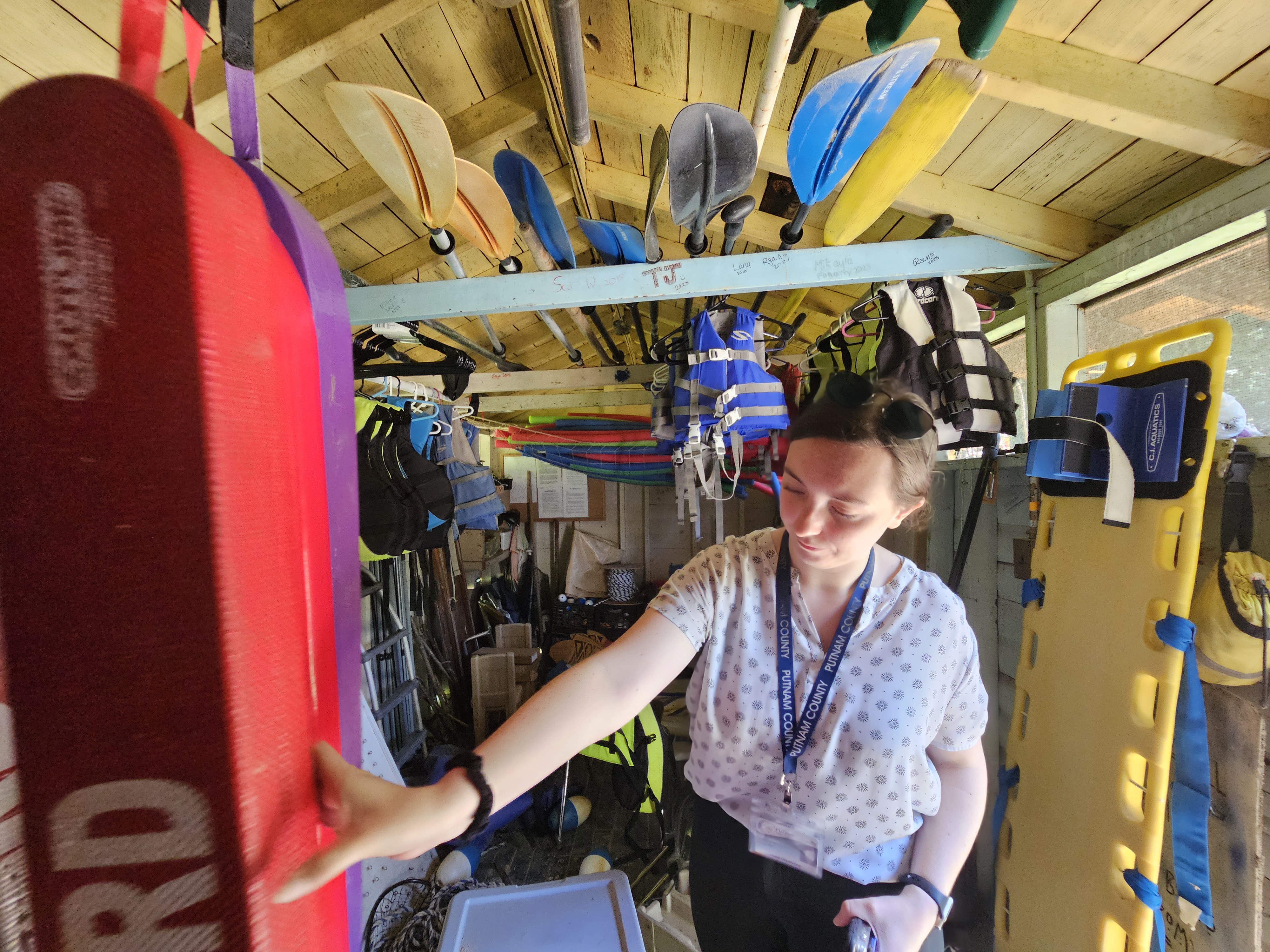
Red rescue tubes are a key component to ensuring a safe waterfront. Emily inspected the devices to make sure their vinyl exteriors were in good shape and that the available quantity was appropriate for the size of the beach.

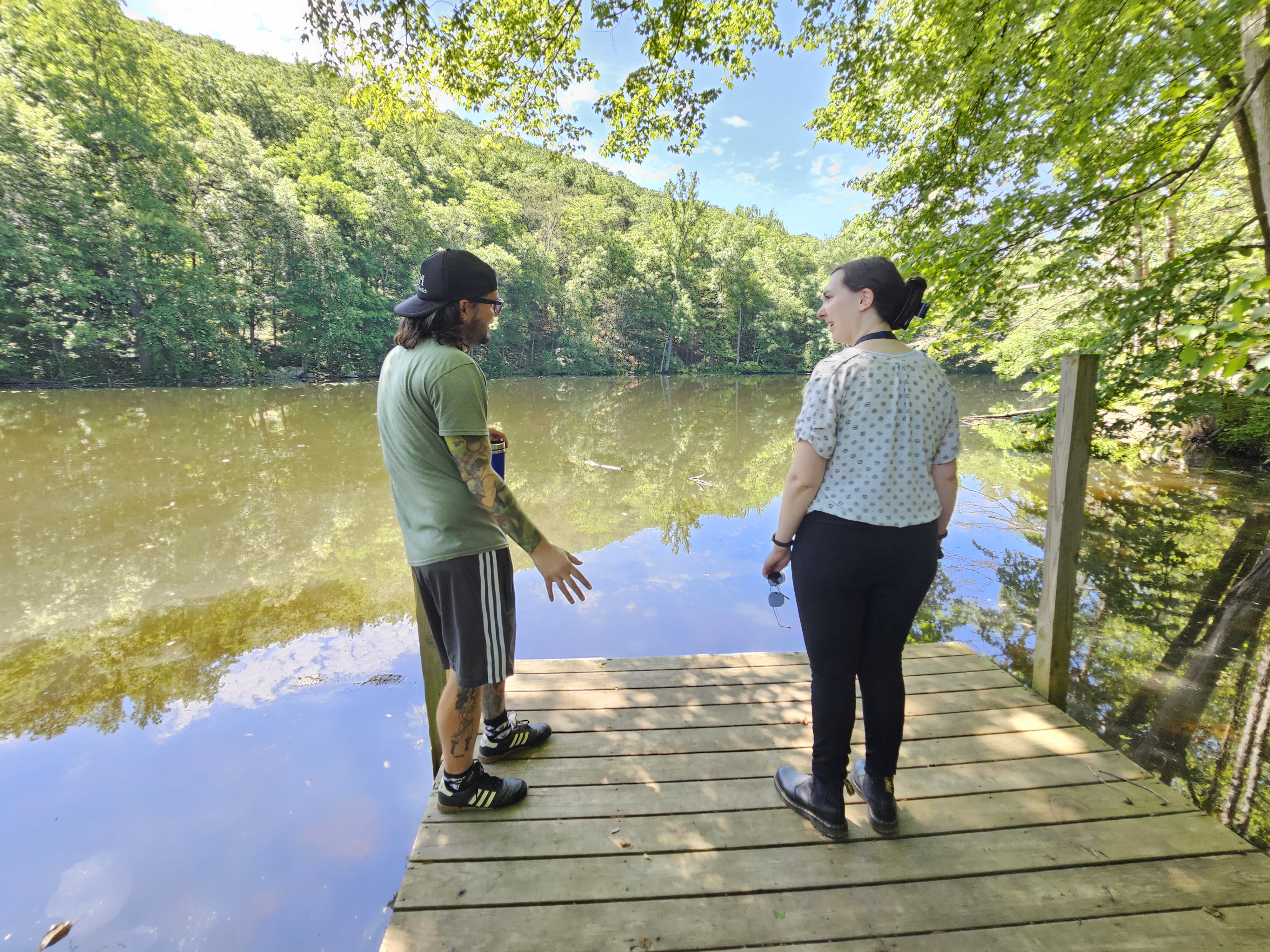
Swimming areas are another focus of an onsite inspection. One concern for docks is always the depth of the water and whether diving is allowed. For safety issues diving is not permitted in water that is not at least 8 feet deep.
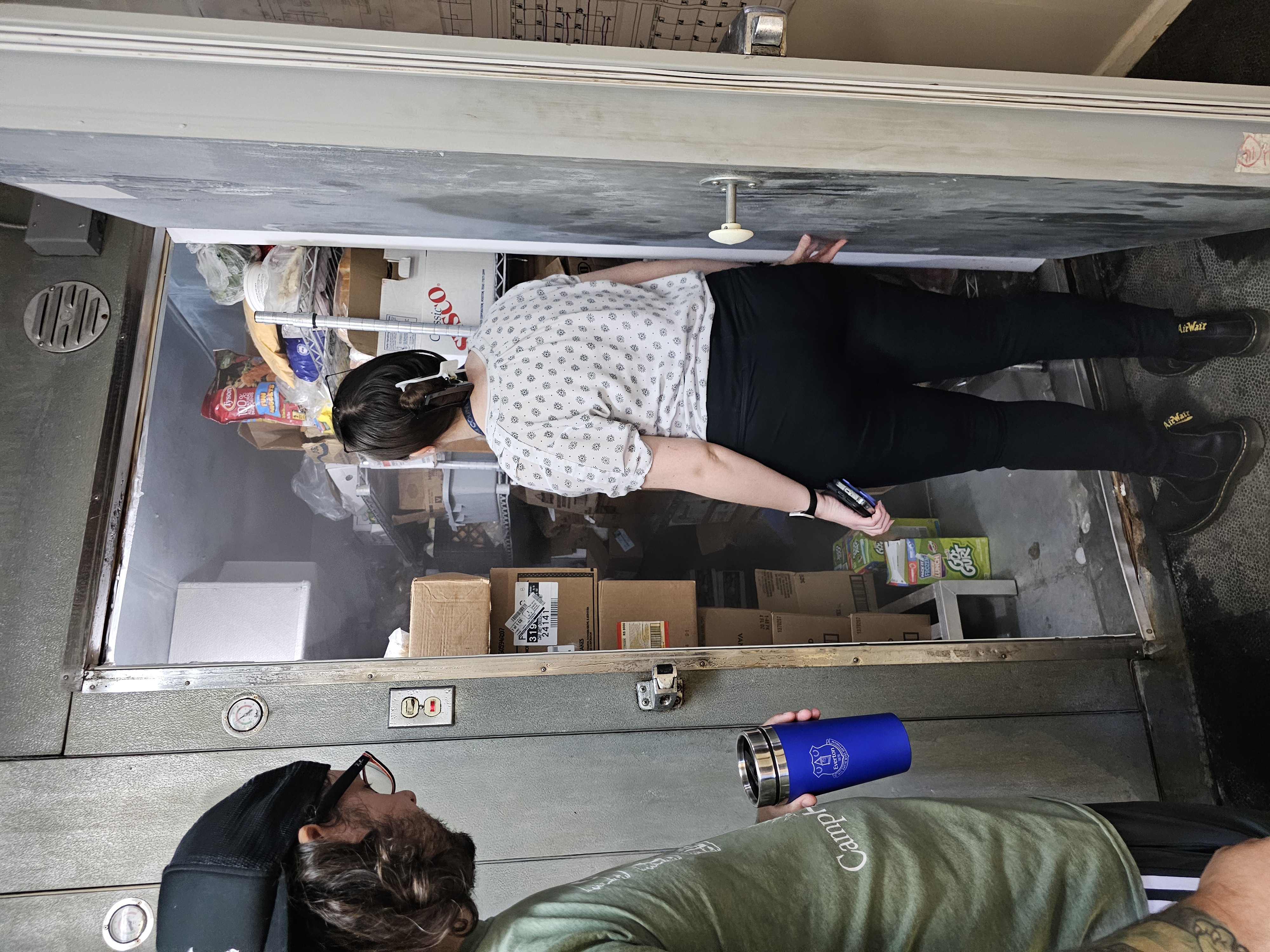
Walk-in freezers are another inspection point at both camps and restaurants. Public health sanitarian Emily Olenius ensures that the proper temperatures are maintained, and that food is shelved and not on the floor.
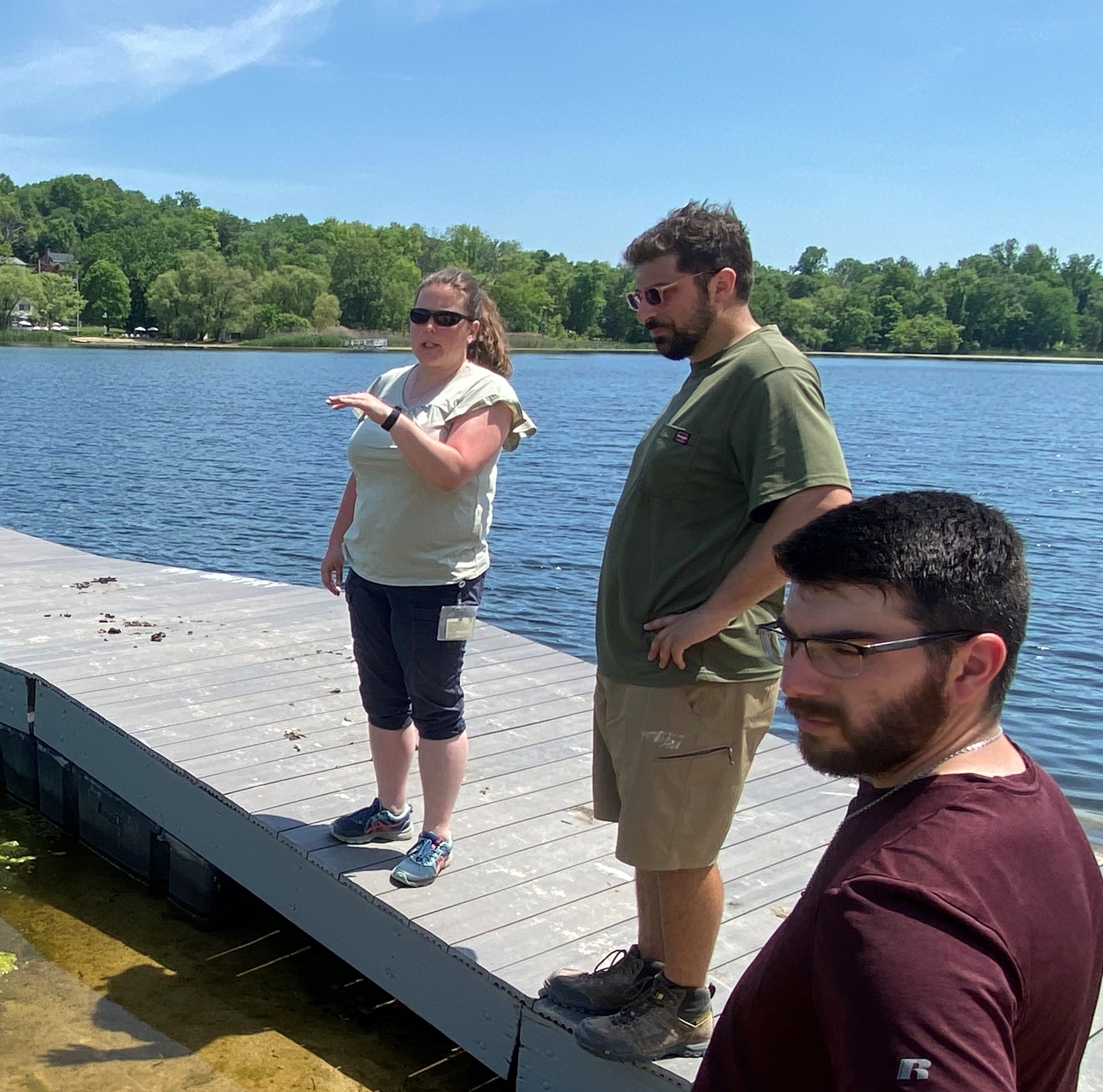

Tonetta Lake staff also on hand for the beach site inspection were from left: head lifeguards Luke Sanchez, Ashley Rampolla and recreation assistant John Fenty.

The mission of the Putnam County Department of Health is to improve and protect the health of the Putnam County community. The department, nationally accredited by the Public Health Accreditation Board (PHAB) through 2029, serves a community composed of nearly 100,000 residents. Core services are provided through a lens of equity, and include community health assessment, disease surveillance and control, emergency preparedness, environmental health protection, family health promotion and health education. For more information, please visit the County website at www.putnamcountyny.com, or visit our social media sites on Facebook, X (formerly known as Twitter) and Instagram @PutnamHealthNY.
Additional Articles
Welcome Message
The mission of the Putnam County Department of Health is to improve and protect the health of our community.
We strive to prevent the spread of disease, protect against environmental hazards, promote healthy lifestyles, ensure access to quality health services, and respond to disasters.
We encourage you to explore our website and contact us if you have any questions.
In the event of an emergency, Health Department staff are available 24/7. Please call 845-808-1390 to report a public health emergency, rabies exposure, communicable disease, water outage or sewer overflow.
If you are a member of the media and would like to contact the health department, please email
Contact the Department of Health
-
Office | 845.808.1390
-
Fax | 845.278.7921
-
Fax (Nursing) | 845.279.4104

Putnam County Office Building
40 Gleneida Avenue
Carmel, New York 10512
© 2005 - Putnam County Online
Powered by ![]() Flight
Flight










